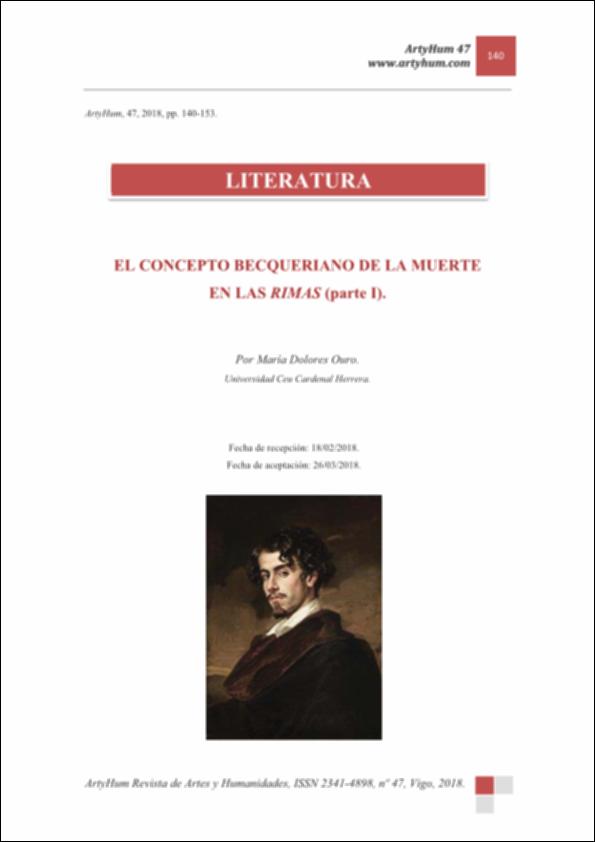Please use this identifier to cite or link to this item:
http://hdl.handle.net/10637/9052El concepto becqueriano de la muerte en las "Rimas". Parte I
| Title: | El concepto becqueriano de la muerte en las "Rimas". Parte I |
| Other Titles: | Rimas y leyendas. |
| Authors : | Ouro Agromartin, María Dolores |
| Keywords: | Bécquer, Gustavo Adolfo, 1836-1870. Rimas - Crítica e interpretación.; Bécquer, Gustavo Adolfo, 1836-1870. Rimas - Criticism and interpretation.; Muerte en la literatura - s. 19 - España.; Death in literature - 19th. century - Spain.; Romanticism - Spain - History and criticism.; Hope.; Literatura española - s. 19 - Historia y crítica.; Spanish literature - 19th century - History and criticism.; Romanticismo (Literatura) - España - Historia y crítica.; Esperanza. |
| Publisher: | Dña. Beatriz Garrido Ramos y D. José Ángel Méndez Martínez. |
| Citation: | Ouro Agromartin, M.D. (2018). El concepto becqueriano de la muerte en las "Rimas". Parte I. ArtyHum Revista Digital de Artes y Humanidades. Vigo (Pontevedra) : Dña. Beatriz Garrido Ramos y D. José Ángel Méndez Martínez. N. 47 (2018), Sección Literatura, pp. 140-153. |
| Abstract: | Gustavo Adolfo Bécquer escribió sobre el concepto de la muerte, tema recurrente en la literatura de cualquier época, pero observada desde diferente perspectiva. Con la frase en su lecho de muerte de “Todo mortal”, abrió una dimensión de conocimiento contraria a la visión de cualquier ser humano de su época. Se hizo varias preguntas que resolvió en la misma Rima en la que se las planteó, y nos transmitió su visión a través de sus escritos más representativos. Su idea transmite esperanza para el más allá a todo ser humano que se cuestiona su propia existencia y su futuro después de esta corta vida. / Gustavo Adolfo Bécquer wrote about the concept of death, theme recurring in the literature of any season, but observed from different perspective. With the phrase on his deathbed in “Every mortal”, opened a dimension of knowledge contrary to the vision of any human being of his time. He made several questions that did meet in the same rhyme that raised them, and he transmitted us his vision through its most representative writings. His idea conveys hope for the afterlife to all mankind who questioned the very existence and its future after this short life. |
| URI: | http://hdl.handle.net/10637/9052 |
| Rights : | http://creativecommons.org/licenses/by-nc-sa/4.0/deed.es |
| ISSN: | 2341-4898 |
| Issue Date: | 1-Apr-2018 |
| Center : | Universidad Cardenal Herrera-CEU |
| Appears in Collections: | Dpto. Humanidades |
Items in DSpace are protected by copyright, with all rights reserved, unless otherwise indicated.


